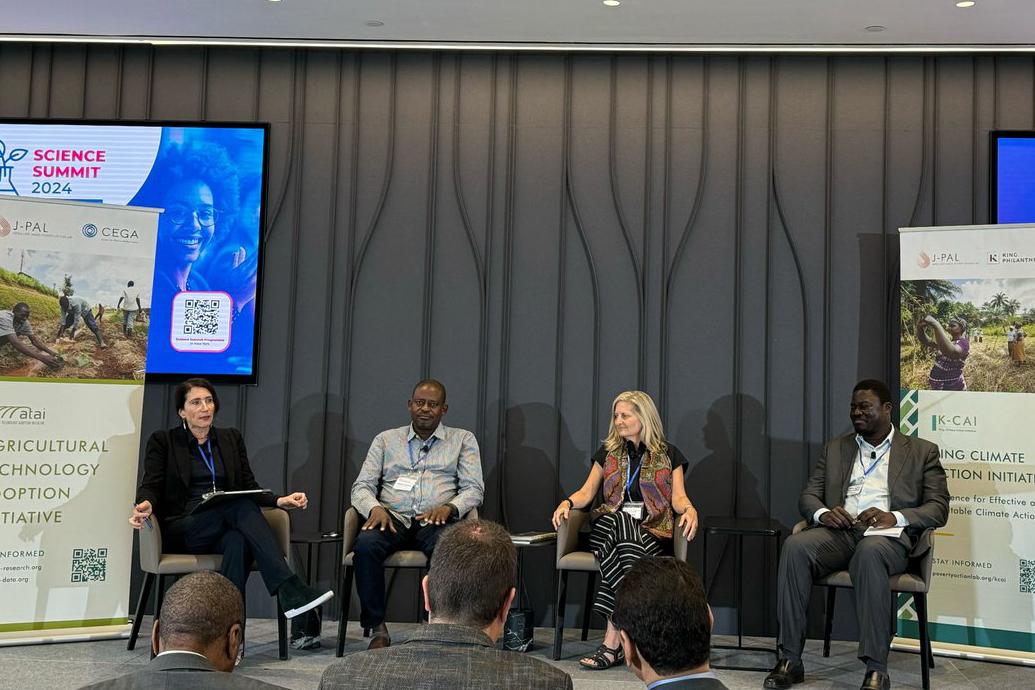
The King Climate Action Initiative: Accelerating solutions at the nexus of climate and poverty
The King Climate Action Initiative (K-CAI), dedicated to effective and equitable climate action in partnership with King Philanthropies, continued to inform climate action worldwide by partnering with policymakers, NGOs, and businesses to use insights from rigorous evidence.
K-CAI has powered
Our partners

"King Philanthropies is proud of what K-CAI has achieved in just four years to catalyze innovation and scale at the nexus of climate and livelihoods. Research findings are already being scaled up, which is a testament to the power of partnerships between innovators and researchers to find climate solutions that can benefit the most vulnerable."
— Kim Starkey, President and CEO of King Philanthropies
Championing evidence-informed climate action at UNGA and COP29
J-PAL co-organized a full day event during the Science Summit at the UN General Assembly together with the Innovation Commission for Climate Change, Food Security, and Agriculture. The event aimed to raise awareness and support for evidence-based policies to combat desertification.
Panelists shared scalable policy and technological solutions to combat desertification and promote agricultural resilience, featuring innovations funded by K-CAI and J-PAL and the Center for Effective Global Action’s Agricultural Technology Adoption Initiative (ATAI). Among these innovations was rainwater harvesting in Niger, where a K-CAI-funded research team is working with local partners to scale a program, initially rigorously tested with support from ATAI, training farmers to adopt rainwater harvesting techniques.

Also during UNGA, J-PAL’s Corporate Impact and Sustainability team and K-CAI, with support from Community Jameel and King Philanthropies, convened a roundtable event where speakers from industry and academia discussed the role of independent and rigorous evidence in their impact investment strategies. Discussion also highlighted the value of businesses partnering with researchers, citing insights from several evaluations, including one with Virgin Atlantic Airways and other companies that have collaborated with the J-PAL network.
Following UNGA, J-PAL Middle East and North Africa’s Hub of Advanced Policy Innovation for the Environment (HAPIE) hosted a roundtable event at the 29th Climate Change Conference of the Parties with support from Community Jameel. At the event, leaders from the private sector, government, civil society, and academia discussed the importance of public-private partnerships for climate resilience. Representatives from HAPIE, J-PAL South Asia’s Solutions and Advancements through Research for Water and Air, and UM6P-J-PAL Agricultural Lab for Africa shared scalable, evidence-based solutions for food and water security. The event was held as part of the Marrakech Partnership for Global Climate Action’s Water Implementation Lab.
Informing governments and generating actionable insights
In 2024, K-CAI-funded research meaningfully informed climate policies and contributed to clear recommendations for decision makers. K-CAI also joined forces with MIT on the newly-launched Climate Project to accelerate practical climate solutions and bring J-PAL’s approach to the table.
Reducing brick manufacturing emissions in Bangladesh
In Bangladesh, brick manufacturing is dominated by inefficient coal-burning kilns and is responsible for roughly 17 percent of CO2 emissions and 11 percent of particulate matter pollution annually. Building on results from a K-CAI-funded randomized evaluation and with further scaling support from K-CAI, researchers were invited by the Government of Bangladesh to work with local research institutions to scale training programs for brick manufacturers on the proper operation of more efficient kilns. To date, people operating over 500 kilns have been trained, abating an estimated $20 million in carbon emissions. The team is looking to expand to new geographies.
Decreasing air pollution in India
Last year, the Government of Gujarat worked with a K-CAI-funded research team, J-PAL South Asia, and EPIC India to scale an emissions market for air pollution that has reached 15 million people and generated $1 billion in health benefits, as estimated by researchers, from decreased pollution.
Cost-effectively protecting forests and reducing emissions in Latin America
When designed and implemented well, payment for ecosystem services (PES) programs can be a promising and cost-effective climate mitigation solution. K-CAI-funded researchers recently published an article in Nature Communications on how modifying certain design features, such as using contracts that are harder to game, could increase Mexico’s national PES program’s effectiveness in reducing deforestation and thereby delaying carbon emissions.
In 2024, J-PAL affiliated researchers and embedded staff in the Brazilian Ministry of Planning began evaluating and using these insights to inform the design of the PES program Bolsa Verde, which focuses on reducing deforestation in threatened biomes like the Amazon.

Our work has benefited a lot from the collaboration with J-PAL staff and researchers, and the robustness of the monitoring and evaluation plan designed for Bolsa Verde during 2024 is a testimony of that. We are now eager to implement the plan and to use its results to enhance the program’s effectiveness. Also, during the coming year, we hope to expand the partnership to encompass other policies and programs. I’m convinced that J-PAL can play a pivotal role in helping us foster an evaluation culture within the Brazilian government.
— Daniel Grimaldi, Undersecretary for the Evaluation of Public Policies and Economic Affairs at the Ministry of Planning in Brazil
J-PAL’s Air and Water Labs
The Air and Water Labs, founded in partnership with Community Jameel, generate and scale evidence-informed clean air and water solutions with government partners. Led by J-PAL’s regional offices in Egypt, India, and South Africa, the three regional Air and Water Labs are:
- Hub of Advanced Policy Innovation for the Environment, led by J-PAL Middle East and North Africa with the Ministry of Planning, Economic Development, and International Cooperation, as an extension of the Egypt Impact Lab, embedded in the National Institute of Governance and Sustainable Development
- Solutions and Advancements through Research for Water and Air, led by J-PAL South Asia with the Gujarat Pollution Control Board, Department of Drinking Water and Sanitation, and other key state and central government partners
- Water, Air, and Energy Lab, led by J-PAL Africa with the City of Cape Town
In 2024, the labs kicked-off work diagnosing challenges, designing potential solutions, and evaluating the effectiveness of promising solutions—funding seven research studies and one scale-up project.

Communities across the world continue to face challenges in accessing clean air and water, a threat to human safety that has only been exacerbated by the climate crisis, along with rising temperatures and other hazards. Through our collaboration with J-PAL and C40 in creating climate policy labs embedded in city, state, and national governments in Africa and South Asia, we are committed to innovative and science-based approaches that can help hundreds of millions of people enjoy healthier lives.
— George Richards, Director of Community Jameel
New policy lessons on growing farmers’ resilience to climate change
As unpredictable and extreme weather increases due to climate change, how can policymakers protect farmers’ yields, profits, and overall well-being? K-CAI and ATAI teams wrote a new Policy Insight, which finds that agricultural technologies are a key piece of the puzzle but are not always enough. Policymakers may need to complement these technologies with social assistance programs to protect farmers’ livelihoods.
Enabling new research and scaling efforts
To date, K-CAI has funded over 80 research studies and 13 scaling projects.
Scaling contests for cost-effective energy conservation in Vietnam
Vietnam is exploring innovative strategies for cost-effective energy conservation. Researchers are partnering with EVN Hanoi to evaluate contests’ ability to scale within budgetary constraints and over longer periods of time to conserve energy and reduce particulate and carbon emissions.
Real-time satellite monitoring of waste dumpsites to reduce greenhouse gas emissions in Peru
Fires at waste sites contribute to greenhouse gas emissions and air pollution. In Peru, researchers are partnering with the national enforcement agency to implement and evaluate the impact of a remote-sensing system to better monitor and reduce waste site fires in the face of staffing constraints.
Addressing drinking water scarcity through water entrepreneurship in Bangladesh
Climate change-induced saltwater intrusion has created a shortage of clean drinking water for 20 million people in coastal Southwest Bangladesh. To help address this, research teams from the Yale Research Initiative on Innovation & Scale (Y-RISE) and MIT, along with BRAC's climate change program, are co-designing a scalable intervention to identify and support “water entrepreneurs” who will use BRAC microfinance loans to set up reverse osmosis plants to sell desalinated drinking water to their whole community. This project is part of the Jameel Observatory Climate Resilience Early Warning Systems Network (JO-CREWSnet), which empowers vulnerable communities with evidence-based actions for climate adaptation.
Implementing agroforestry in the supply-chain for coffee farmers
Agroforestry can have climate change mitigation and adaptation benefits to coffee farms—from sequestering carbon emissions to providing protection from heat—but its adoption is low. Researchers are evaluating if embedding a payments for ecosystem services program within pre-existing buyer-farmer relationships will better incentivize agroforestry.
Leadership
Lead photo credit: M Mahbub A Alahi, Creative Commons


